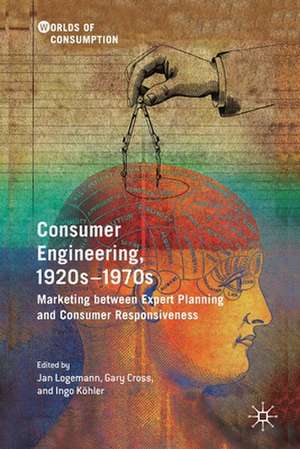Consumer Engineering, 1920s–1970s: Marketing between Expert Planning and Consumer Responsiveness: Worlds of Consumption
Editat de Jan Logemann, Gary Cross, Ingo Köhleren Limba Engleză Paperback – 14 aug 2020
| Toate formatele și edițiile | Preț | Express |
|---|---|---|
| Paperback (1) | 528.13 lei 43-57 zile | |
| Springer International Publishing – 14 aug 2020 | 528.13 lei 43-57 zile | |
| Hardback (1) | 703.85 lei 43-57 zile | |
| Springer International Publishing – 14 iun 2019 | 703.85 lei 43-57 zile |
Preț: 528.13 lei
Preț vechi: 621.33 lei
-15% Nou
Puncte Express: 792
Preț estimativ în valută:
101.05€ • 105.79$ • 83.62£
101.05€ • 105.79$ • 83.62£
Carte tipărită la comandă
Livrare economică 07-21 aprilie
Preluare comenzi: 021 569.72.76
Specificații
ISBN-13: 9783030145668
ISBN-10: 3030145662
Pagini: 296
Ilustrații: XI, 296 p. 24 illus., 8 illus. in color.
Dimensiuni: 155 x 235 mm
Greutate: 0.44 kg
Ediția:1st ed. 2019
Editura: Springer International Publishing
Colecția Palgrave Macmillan
Seria Worlds of Consumption
Locul publicării:Cham, Switzerland
ISBN-10: 3030145662
Pagini: 296
Ilustrații: XI, 296 p. 24 illus., 8 illus. in color.
Dimensiuni: 155 x 235 mm
Greutate: 0.44 kg
Ediția:1st ed. 2019
Editura: Springer International Publishing
Colecția Palgrave Macmillan
Seria Worlds of Consumption
Locul publicării:Cham, Switzerland
Cuprins
1. Beyond the Mad Men: Consumer Engineering and the Rise of Marketing Management, 1920s–1970s: An Introduction.- I. Twentieth-Century Marketing: Aspirations and Limits, Costs, and Benefits.- 2. Marketing as "Consumer Engineering"? A Concept in Transatlantic Perspective, 1930s–1960s.- 3. What Does "Fast Capitalism" Mean for Consumers? Examples of Consumer Engineering in the United States.- 4. A Theoretical Exploration of Consumer Engineering: Implicit Contracts and Market Making.- II. Consumer Engineers and Transatlantic Exchanges at Mid-Century.- 5. Shopping Malls and Social Democracy: Victor Gruen's Postwar Campaign for Conscientious Consumption in American Suburbia.- 6. Consumer-Based Research: Walter Landor and the Value of Packaging Design in Marketing.- 7. German-Style Consumer Engineering: Victor Vogt's Verkaufspraxis, 1925–1950.- III. Consumer Engineering Practices in Postwar Europe.- 8. Consumer Credit as a Marketing Tool: The French Experience in European andTransatlantic Comparison, 1950s–1960s.- 9. Adidas and the Creation of a Transnational Market for German Athletic Shoes, 1948–1978.- 10. Imagined Images, Surveyed Consumers: Market Research as a Means of Consumer Engineering, 1950s–1980s.- IV. Consumer Engineering and Consumer Movements.- 11. Marketing a New Society or Engineering Kitchens? IKEA and the Swedish Consumer Agency.- 12. “The Consumer Crusader”: Hugo Schui and the German Consumers Association.- 13. Consumer Engineering by Belgian Consumer Movements: From Modern Marketing with a Transnational Touch to Late-Modern Insecurities, 1957–2000.
Notă biografică
Jan Logemann is Assistant Professor of Economic and Social History at the University of Göttingen, Germany.
Gary Cross is Distinguished Professor Emeritus of History at Pennsylvania State University, USA.
Ingo Köhler is Assistant Professor of Economic and Social History at the University of Göttingen, Germany.
Textul de pe ultima copertă
In the middle of the twentieth century, a new class of marketing expert emerged beyond the familiar ad men of Madison Avenue. Working as commercial designers, consumer psychologists, sales managers, and market researchers, these professionals were self-defined “consumer engineers,” and their rise heralded a new era of marketing. To what extent did these efforts to engineer consumers shape consumption practices? And to what extent was the phenomenon itself a product of broader social and cultural forces? This collection considers consumer engineering in the context of the longer history of transatlantic marketing. Contributors offer case studies on the roles of individual consumer engineers on both sides of the Atlantic, the impact of such marketing practices on European economies during World War II and after, and the conflicted relationship between consumer activists and the ideas of consumer engineering. By connecting consumer engineering to a web of social processes in the twentiethcentury, this volume contributes to a reassessment of consumer history more broadly.
Caracteristici
Reassesses the concept of consumer engineering in a comparative, transnational framework, moving beyond the familiar narrative of consumer manipulation Considers the history of consumer engineering in the context of mid-century developments such as social engineering, modernist planning and design, and the professionalization of various fields Appeals to scholars of marketing and business history, consumer culture, social engineering, social movements, transnational history, and the history of capitalism











